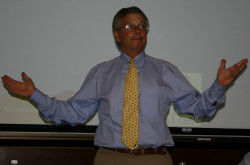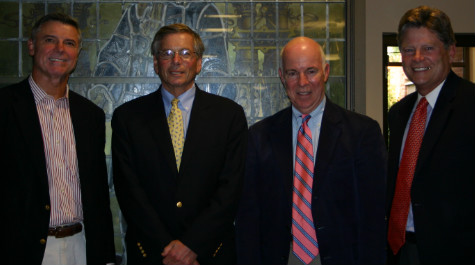Nationally Known Consultants Offer Students Career Advice for Challenging Job Market
The panelists noted that the traditional law firm hiring model is evolving. Their presentations focused on educating students about different employment paths in light of the seismic changes in law practice and the demand for legal services during the past two years.

Clifford spoke about the migration of clients away from large law firms and the use of alternative billing and compensation systems. As the role of large firms is changing, Clifford recommended that job-seekers “broaden the scope of the kind of job you are looking for.” He proposed seeking jobs in practice areas that have not been hit as hard by the recession or where demand may increase, such as wind and solar energy, green technology, health care, estate planning and family law.
Durham, author of The Essential Little Book of Great Lawyering, added that applicants must differentiate themselves. Many law firms use a “holistic approach” to hiring, focusing on more than an applicant’s academic credentials. Firms place significant emphasis on an applicant’s practical experience. The good news for William & Mary students, said Durham, is that “this school prepares you better than almost any other school for hitting the ground running. You graduate with a solid understanding of what it means to be in practice.” Durham also recommended taking one or more business courses and developing writing and management skills.
Johnson spoke about characteristics clients value in lawyers, noting that clients want much more than merely competent lawyers. Johnson emphasized being available, accessible, efficient, pragmatic and practical, and knowing the client’s business. He stressed, “It’s all about relationships.” Lawyers who have these traits and who forge effective relationships will cultivate clients, and law firms look to hire lawyers who generate business.
The panel also urged students to consider employment settings other than large law firms in large cities, encouraging students to take a long-term view of their careers. Johnson said: “You have to think like an entrepreneur.” He suggested, for example, becoming the lawyer for a start-up social media company in order to develop a noticeable, unique skill set. Using their own career paths as examples, the panelists emphasized that students need not be overly concerned with becoming pigeon-holed. Instead, students should be less risk averse, focus on the benefits that each job offers, and realize that a career is “a marathon, not a sprint.”
Sweet reiterated that in the current economic climate, clients are refusing to pay to train new lawyers. That is why the William & Mary experience is so beneficial, he said, pointing to the Legal Skills program as an example of how the Law School teaches practical skills. “This is a school that saves firms that first year training.” He also spoke about how the most satisfying part of being a lawyer is becoming a trusted advisor. “I love that the whole ethos of this law school is the citizen lawyer. It is hugely important to have that skill set.”



